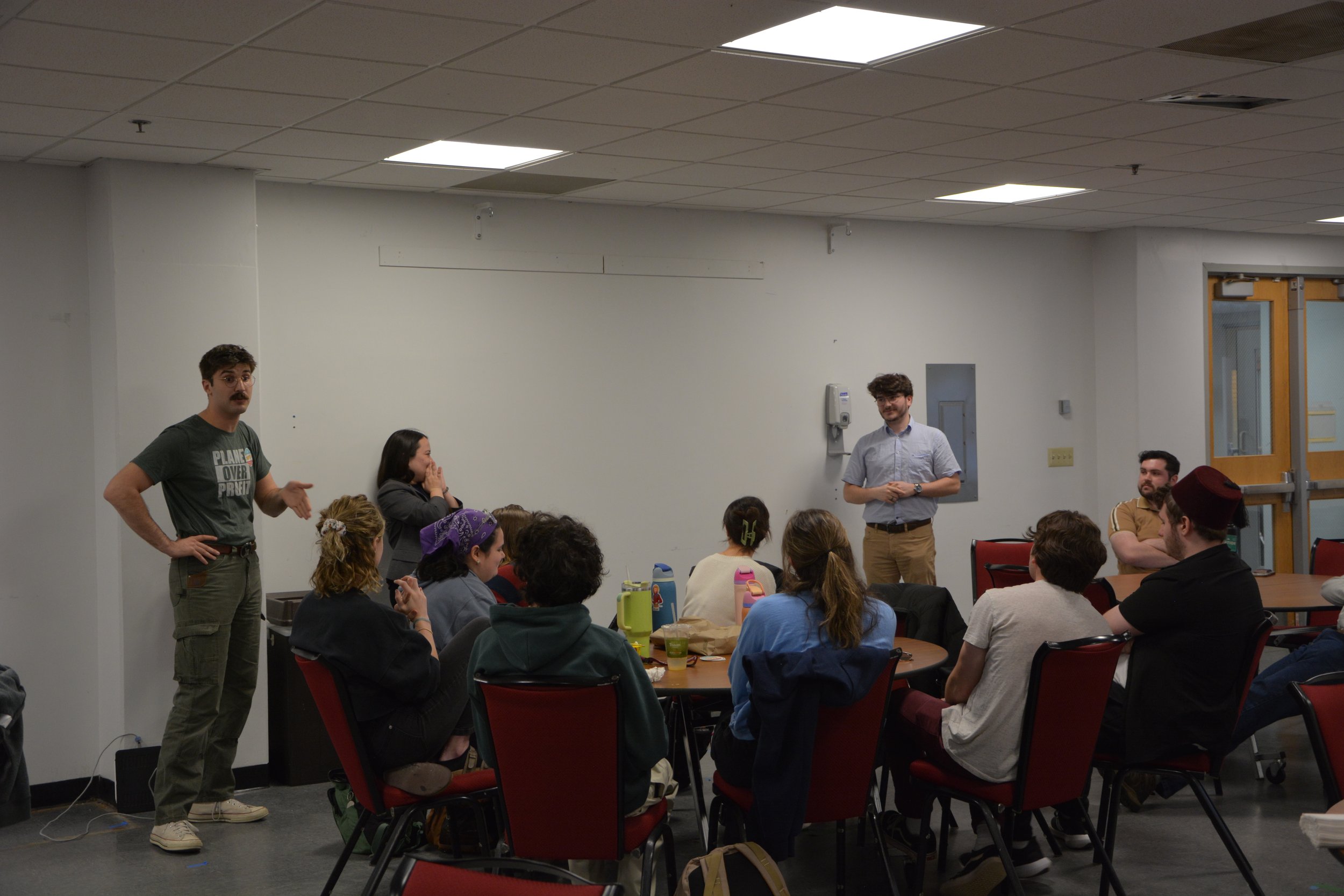
About CRAN
"By giving me both autonomy to run my own projects and help when I asked for it, CRAN has helped me get my foot in the door for environmental policy work and advocacy. Their flexibility allows me to have experiences that I wouldn’t have had otherwise—experiences that show me that I can do environmental work in the long term."
- Cassie Gelston
"We are a passionate generation and we want to make a positive change, but knowing where to start can be tricky. If you’re in high school or college and want to get into real work around environmentalism, my first suggestion is to get involved with CRAN."
- Chris Sotiro

Our Mission
Empowering Youth for Environmental Action in New Jersey
New Jersey’s diverse ecosystems are facing serious threats, putting their future and ours at risk. These environmental issues are fundamentally humanitarian crises that demand immediate attention. We're here to create a platform for the next generation to lead meaningful change, build strong connections across communities, and drive independent initiatives to protect our environment and our people.
Our mission is to cut through bureaucratic red tape and drive impactful work that heals the relationship between humanity and nature.
We stand with Indigenous and minority communities who have been unjustly burdened by environmental harm for generations. These vulnerable communities are hit hardest by man-made climate change, and we’re not here to just watch. Environmental issues are economic and health issues that affect us all.
We are CRAN, and we’re committed to fighting for environmental justice for every community.

Our Demands
At CRAN, we stand for transparency and unity. We're driving state-level initiatives and advocating for our demands on crucial environmental issues. We're also pushing for major federal policies to be included in the 2024 Democratic platform and demanding that New Jersey's federal candidates support these measures.
-
Anthropogenic climate change is the single greatest threat to the health and prosperity of our state. To stave off the most severe effects of climate change and to mitigate ongoing environmental damages caused by the burning of fossil fuels, New Jersey must take decisive action to modernize its energy portfolio through a sustainable transition to clean, renewable energy. The Climate Revolution Action Network (CRAN) stands in support of sensible and safe offshore wind development off of the coast of New Jersey. Our organization recognizes the necessity for divestment from fossil fuels and investment in the renewable energy sector with the goal of reaching a net-zero carbon energy portfolio. We have a unique opportunity to make our state’s greatest natural resource - the Jersey Shore - work for us, rather than against us in our fight against climate change. Rising sea levels and a longer, more severe hurricane season put our coastal communities at the greatest risk of damage by severe weather events like Superstorm Sandy. Offshore wind energy is a fully renewable and economically viable solution that would allow New Jersey to harness the power of our coastline to provide electricity to millions of homeowners by the end of the decade, all while scaling back our dependence on fossil fuels from overseas and creating thousands of local jobs.
CRAN recognizes the ecological concerns of the community and believes in a strict commitment to mitigating ecological impacts to sediment, vegetation, and wildlife in both the construction, presence, and decommissioning of wind turbines. Clean energy infrastructure will bring a myriad of economic benefits to the Jersey Shore. The offshore wind industry is projected to create 20,000 well paying, union jobs by 2030 in the manufacturing, construction, and operation of turbines all within state border. Once installed, offshore wind will strengthen the Jersey Shore’s booming tourism economy by aesthetically modernizing shoreline communities and opening up doors to the ecotourism industry.
While Ørsted’s Ocean Wind 1 and Ocean Wind 2 projects fell victim to significant hurdles stemming from pandemic-era supply chain issues and high inflation rates, it is important to emphasize that these complications have reverberated through every sector of the economy and are not indicative of the offshore wind industry’s overall potential. CRAN recognizes that Ørsted was not the right company to develop these lease areas, and calls upon Governor Murphy and Attorney General Platkin to enforce accountability for this multi-billion dollar energy company by ensuring compliance with its agreed upon contract obligations to pay the state of New Jersey $300 million in the event that it does not complete its wind farm projects. The state should take every measure to guarantee that these funds are collected and reinvested back into the offshore wind industry to ensure the continuation of these projects under new management by one of the many industry leaders who will not abandon their commitments in the pursuit of short-term profits.
-
As a collective of impassioned young activists, Climate Revolution boldly stands as a unifying force within the Gen-Z and young millennial community. Our unwavering commitment revolves around the shared objective of driving substantive change at local, county, state, and federal-level climate policy.
In a world where millennials and Gen-Z constitute a formidable 42% of the global population, our generation has one choice; save the planet or go down with it. Climate Revolution harnesses this unparalleled vigor to empower youthful advocates, fostering connections within a vast network of kindred spirits committed to climate justice.
The resounding impact of our collective is underscored by the fact that 18 to 34-year-olds in New Jersey overwhelmingly perceive climate change as a "very serious threat." In response, Climate Revolution serves as an incubator, propelling youth activists towards a deeper understanding of the man-made climate crisis and its profound ramifications within the state. Our mission is to kindle awareness, direct action, and catalyze the transformative potential residing within each young New Jerseyian, as we strive to rewrite the narrative of climate change in New Jersey. Climate Revolution is dedicated to arming young activists with the knowledge and skills essential for navigating the complex terrain of organizing.
-
New Jersey's path to net-zero carbon emissions demands an aggressive expansion of solar energy. It’s time to boost grants and tax credits to drive solar panel installations on public buildings across the state. The NJBPU’s Community Solar Program must be fully leveraged to ensure every homeowner and renter can access the benefits of solar energy.
We need relentless community engagement and robust educational outreach to forge strong partnerships between governments and residents. Expanding the Local Government Energy Audit program to provide cost-free energy assessments for municipal buildings is non-negotiable.
Protecting our green spaces is paramount. New Jersey must prioritize solar installations on rooftops, parking lots, and other impermeable surfaces—there’s no excuse for sacrificing natural land. Modernizing the state’s electric grids to support diverse renewable energy sources is a critical step forward.
Local Environmental Commissions and grassroots organizations must lead the charge, pushing hard for initiatives like the Community Solar Resolution.
-
Cars:
CRAN’s stance on electric vehicles requires a nuanced understanding of city and regional planning, transportation infrastructure, and the carbon-pay-back method.
Currently, a majority of local governments across New Jersey utilize car-centric planning when designing cities and towns. Car-centric planning can be defined as the implementation of policies, programs, and designs that prioritize drivers and vehicular traffic at the expense of alternative methods of travel in that of walking, hiking, and biking.
Furthermore, car-centric planning heavily prioritizes private-vehicular use while neglecting public transportation. Car-centric planning has led to significant problems in our environment due to mass emission of carbon, overreliance on gasoline and diesel, and the fragmentation of our communities and open spaces.
Electric vehicles have the opportunity to address two of these core issues in its potential to reduce the state's carbon emissions and fossil fuel intake. However, it is necessary to consider all facets of the EV market, such as lithium mining, battery recycling, and freedom of choice. CRAN’s stance on each of these objections are as follows.
As the automobile industry increases the production of electric vehicles, lithium mining is sure to increase. The growth of mining activity will unfortunately cause habitat degradation and disproportionate harm to Indigenous peoples. Additionally, a strain on this resource is inevitable should the entire world shift toward decarbonization at once. With that, CRAN believes that mining operations must invest in habitat restoration and land reclamation. In light of that CRAN supports research and development of less harmful battery materials such as sodium.
Battery recycling is imperative for sustainable waste management and the mitigation of over-mining. CRAN believes that battery recycling and repurposing is essential for a sustainable EV industry.
CRAN supports the ability to choose their preferred method of travel. In that light, CRAN believes that the state legislature must fully embrace the freedom of choice and give persons a vast array of environmentally sound transportation methods, including but not limited to: walkable main streets and communities, bikeable corridors, consistent and dependable local metro, and regional rapid transit. A non-car-centric approach to city planning is at the core of a sustainable future.
-
The world is undergoing profound changes, influenced by complex systems that impact our daily lives and transcend political boundaries. Governments, businesses, and the people must collaborate to adapt, which requires a deep understanding of the natural world and its relationship to society.
Climate change education is crucial for preparing students to tackle the complexities of the modern world. CRAN wholeheartedly supports New Jersey’s statewide climate education mandate, advocating for approaches that are equitable, evidence-based, and interdisciplinary.
Unfortunately, schools nationwide treat environmental and climate education as an afterthought, missing the opportunity to engage students in hands-on, systems-based learning that fosters a deeper understanding of environmental dynamics and sustainability. Neglecting robust climate education denies young people the tools they need to comprehend and interact with the world, and deprives them of the knowledge essential for making informed decisions in response to environmental challenges and disaster.
Without prioritizing climate education, we risk leaving future generations unprepared to face the realities of a rapidly changing planet. We demand adequate resources for public schools to create hands-on, systems-learning environmental education opportunities for students, and the training of educators who lack a climate education background. Such investments are vital for fostering a well-informed populace capable of addressing environmental issues.
By prioritizing and investing in climate education, we can cultivate informed, proactive New Jerseyans capable of building a sustainable and resilient future.
-
AIR
Air pollution is a grave threat to public health in New Jersey, disproportionately affecting Overburdened Communities (OC). These communities bear an unjustly high burden of pollutants like fine particulate matter (FPM), ozone, and lead—dangerous contaminants linked to cardiovascular disease, lung cancer, asthma, and diminished lung function. The toll of FPM alone surpasses that of car crashes in annual deaths across the U.S.
New Jersey must take bold action to ensure clean air for all, regardless of socio-economic status or location. This includes rigorous regulations on industrial emissions and strict enforcement of environmental laws, especially in OCs. Community empowerment is crucial; OC residents must be educated and actively involved in shaping environmental policies and climate action.
CRAN demands climate resilience measures that prioritize the specific needs of OCs. We will engage with policymakers to champion legislation that addresses air pollution with an acute focus on equity. By tackling the root causes, promoting sustainable alternatives, and empowering communities, New Jersey can become a leader in the fight against air pollution, ensuring every resident breathes clean air.
WATER
Access to clean drinking water is a basic human right, yet it remains unequal across New Jersey. Climate change will exacerbate this issue, with increasing severe weather leading to coastal and inland flooding that contaminates drinking water through stormwater runoff and erosion.
Overburdened Communities (OC) are particularly vulnerable, plagued by some of the oldest stormwater infrastructure in the country, including lead service lines and combined sewer overflow systems (CSOs). Lead piping contaminates drinking water, causing serious health issues like hypertension and kidney damage. CSOs leak sewage and wastewater into local waterbodies during intense rainstorms, further threatening public health. Newark, Trenton, Camden, and Jersey City are among the hardest hit.
CRAN calls for immediate, equitable investment in climate-resilient stormwater infrastructure. This includes replacing all lead service pipes, developing ambitious long-term control plans for CSOs, and investing in green infrastructure to reduce stormwater runoff. Every New Jersey resident deserves access to safe, clean water, and we must act now to make that a reality.
-
Our planet is facing the dire consequences of prolonged climate inaction, with millions displaced by extreme weather events and unprepared infrastructure. Despite efforts to reduce carbon emissions, New Jersey remains on the frontlines of escalating climate impacts. The state's location makes it highly vulnerable to sea-level rise, intensified storm surges, and flooding. As the most densely populated state, New Jersey also faces unique risks from heatwaves and the heat-island effect. Communities along waterways and shorelines are at immediate risk of erosion, flooding, and property damage, while urban populations face severe health threats from rising temperatures. Without significant investments in climate resilience, New Jersey is at risk of infrastructure failures, economic setbacks, and disruptions to daily life.
Disaster readiness is critical given New Jersey’s susceptibility to these evolving threats. The state needs comprehensive infrastructure upgrades and widespread community education to ensure residents are equipped to respond effectively in emergencies. With climate change accelerating, proactive disaster readiness is essential to protect lives, property, and the resilience of our communities. Our focus must extend beyond carbon neutrality; governments must rapidly strengthen our defenses by investing in green infrastructure.
CRAN urges significant investment in climate resilience to protect New Jersey’s communities. True climate resilience means a system can withstand disturbances and maintain its core functions. Prioritizing diverse forms of green infrastructure—such as riparian buffers in flood-prone areas, wetland restoration, retention basins, LEED-certified buildings, and strategic vegetation planting—is essential to combating the heat island effect and managing flood risks. Legislators should require green infrastructure integration into all building projects.
-
Climate Revolution Action Network strongly opposes the proposed hydrogen energy plants in South Jersey under the Mid-Atlantic Clean Hydrogen Hub (MACH2) project. This initiative’s reliance on fracked gas from Pennsylvania to produce “blue hydrogen” is a blatant example of greenwashing, misleadingly labeled as “clean energy.” Such projects perpetuate fossil fuel dependence, posing significant environmental and public health risks.
Fracking is inherently destructive, polluting airways, contaminating groundwater, and degrading ecosystems—directly contradicting New Jersey’s decarbonization goals and CRAN’s definition of clean energy. Any energy production involving carbon-based fuels continues to endanger public health and the environment.
The MACH2 project also includes “pink hydrogen,” derived from nuclear energy. This would depend on aging nuclear plants in Salem County, which are nearing the end of their operational lifespans. Extending the life of these plants would impose significant additional costs on taxpayers for decommissioning, replacement, and maintenance.
New Jersey’s clean energy transition must prioritize minimizing environmental impacts and promoting ecological sustainability. Including fracked gas in the energy mix undermines these goals. CRAN advocates for investments in genuinely clean and renewable energy sources like wind and solar, aligning with our vision of a net-zero carbon emissions energy economy.
-
Consumer demand and evolving markets have spurred unchecked development of warehouses, factories, and shipping routes across New Jersey, often encroaching on residential areas, schools, and farmland. This rapid expansion has led to increased traffic congestion and added stress on disadvantaged communities, natural corridors, stormwater runoff, and emissions.
This surge in warehouse sprawl is due to developers exploiting outdated municipal zoning codes. Updating these codes is the responsibility of local governments, but many towns lack the financial resources or expertise to do so effectively. As a result, they are particularly vulnerable to poorly planned zoning and warehouse projects, unable to adequately manage the planning process or prepare for the adverse impacts of such sprawl.
CRAN calls for legislative action to provide municipalities with the resources needed to update their zoning ordinances and combat warehouse sprawl proactively. Developing warehouse-specific model land-use ordinances will streamline rezoning processes and empower municipalities to have a stronger voice in the siting of warehouses.
We stand in solidarity with land preservation initiatives that secure open spaces for current and future generations. Preserving land and open spaces is crucial for a sustainable and inclusive environment for both humans and wildlife. Unnecessary and disruptive development must be prevented to protect these vital areas.
Board of Directors
Leadership Team
-
Anna Muller
ENERGY POLICY MANAGER
-
Leann Bey
DIRECTOR OF MARKETING
-
Kayleigh Henry
PINE BARRENS LEAD
-
Andrés Caceres
SPANISH COMMUNICATION CO-LEAD
-

Camila Guayasamin
SPANISH COMMUNICATION CO-LEAD
-

NINA RADTKE
ARTIST IN RESIDENCE
-

Cassy Gelston
CLIMATE RESILIENCE LEAD
-

Max Aronow
GRANT SPECIALIST











